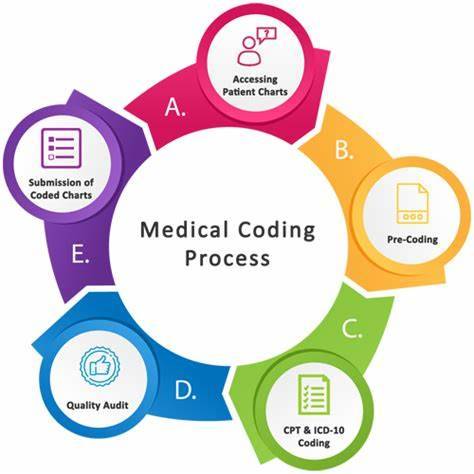#Clinical Research Institute
Text
Why Should You Consider a Career in Medical Coding?

Introduction
Are you looking for a rewarding career in the healthcare industry that doesn't require years of medical school? If so, medical coding might be the perfect choice for you. In this blog, we'll explore the exciting world of medical coding, its importance in clinical research, and why you should seriously consider it as a career option. Let's dive in!
What is Medical Coding?
Medical coding is like the language of healthcare. It involves transforming medical information such as diagnoses, procedures, and treatments into universal codes. These codes are used for various purposes, including billing, insurance claims, and clinical research. Essentially, medical coders are responsible for ensuring that the healthcare system runs smoothly by accurately documenting patient records.
Why Choose a Career in Medical Coding?
1. In-Demand Career: The healthcare industry is constantly growing, and with it, the demand for skilled medical coders. Hospitals, clinics, insurance companies, and research institutions are always in need of qualified professionals to handle their coding needs.
2. Short Training Period: Unlike many other healthcare careers that require years of education, you can become a medical coder relatively quickly. Numerous institutes offer courses and training programs in medical coding that can be completed in a matter of months.
3. Diverse Opportunities: Medical coding isn't limited to just one type of job. You can find opportunities in various settings, including hospitals, private practices, pharmaceutical companies, and research organizations. If you want to explore related fields, you can also transition into areas like pharmacovigilance, drug regulatory affairs, or clinical data management.
4. Stability and Job Security: The healthcare industry is known for its stability, and medical coding is no exception. As long as there are healthcare services, there will be a need for medical coders. This translates to job security and peace of mind in your career.
5. Work-Life Balance: Many medical coding jobs offer excellent work-life balance. You'll typically work regular hours in a comfortable office setting, allowing you to maintain a healthy work-life balance.
6. Good Earning Potential: While salaries can vary based on location and experience, medical coders generally earn a competitive wage. With experience and additional certifications, you can increase your earning potential even further.
7. Contributing to Healthcare: By ensuring accurate coding, you help maintain the integrity of patient records, improve patient care, and support clinical research, pharmacovigilance, drug regulatory affairs, and clinical data management.
The Role of Medical Coding in Clinical Research
Now, let's delve into the connection between medical coding and clinical research. Clinical research plays a vital role in advancing healthcare treatments and therapies. It involves testing new drugs, medical devices, and treatment protocols to ensure their safety and effectiveness. Medical coding is an essential part of this process for several reasons:
1. Data Accuracy: Accurate coding ensures that the data collected during clinical trials is reliable. Researchers rely on this data to make informed decisions about the safety and efficacy of new treatments.
2. Regulatory Compliance: Regulatory agencies, such as the FDA, require precise documentation of clinical trial data. Medical coding helps maintain compliance with these regulations, which is critical for getting new drugs and treatments approved.
3. Patient Safety: Proper coding helps identify any adverse events or side effects experienced by patients during clinical trials. This information is crucial for patient safety and determining the risks and benefits of a new treatment.
4. Data Analysis: Medical coding simplifies the process of data analysis by categorizing information into standardized codes. This makes it easier for researchers to identify trends and draw conclusions from the data.
How to Start Your Career in Medical Coding?
1. Take a course: Look for reputable institutes or online courses that offer medical coding training. These courses cover topics like anatomy, medical terminology, and coding systems such as ICD-10 and CPT.
2. Get Certified: While certification isn’t always required, it can significantly boost your job prospects. Consider obtaining certifications like Certified Professional Coder (CPC) or Certified Coding Specialist (CCS) through recognized organizations.
3. Gain Experience: Entry-level positions may require some on-the-job experience. Look for internships or entry-level coding jobs to build your skills and resume.
4. Stay Updated: Medical coding guidelines and regulations can change, so it’s essential to stay current. Attend workshops, and seminars, and continue your education to remain competitive in the field.
5. Network: Join professional organizations such as the American Health Information Management Association (AHIMA) or the American Academy of Professional Coders (AAPC) to connect with other professionals in the industry.
Conclusion
In conclusion, a career in medical coding offers stability, good earning potential, and diverse opportunities within the healthcare industry. Moreover, it plays a crucial role in clinical research, contributing to the development of new and better treatments for various medical conditions. If you're interested in healthcare, have an eye for detail, and enjoy working in a structured environment, medical coding could be the perfect career choice for you. Consider enrolling in a reputable training program or course to kickstart your journey into this rewarding field. Your future as a medical coder awaits!
#medical coding institute#medical coding training#medical coding course#Clinical research training#Clinical Research Institute#Clinical research course#Pharmacovigilance course#Pharmacovigilance training institute#Pharmacovigilance jobs#Clinical data management course#Clinical data management training institute#Clinical research management
0 notes
Text

Unlock the doors to a rewarding career in healthcare with our Advanced Diploma in Clinical Research!
🏥💡 Clinical research is at the heart of medical advancements, and the demand for skilled professionals is ever-growing. At BCRI, we're proud to offer this comprehensive program that equips you with the knowledge and skills needed to excel in the field. Join us and become a key player in the world of healthcare innovation. Your journey to making a difference starts here! 🌟👩⚕️📚
https://www.bcri.in/advanced-diploma-in-clinical-research/
0 notes
Text
Introduction: The Importance of Clinical Research in the Pharmaceutical Industry Clinical research is a critical component of the drug development process in the pharmaceutical industry.
0 notes
Link
CLRI is an advance clinical research institute and CLRI’s objective is to make our understudies “Fit to be Grabbed as a Clinical Research Professional” and to provide high-quality and innovative approaches and methodologies in Clinical Research
1 note
·
View note
Text
Master in Clinical Research Institute in Mohali
Master in Clinical Research Institute in Mohali
M.Sc in Clinical Research is Postgraduate Degree Course in Medical Research Field. In order to understand the clinical research’s scope in India, we need to have a look at what all is covered under this.
The range of products includes drugs, vaccines, devices, diagnostic agents and treatment regimens. The sector itself caters to maintaining a space for the growth and longevity of human…

View On WordPress
#clinical research institute#clinical research program#master in clinical reaearch#msc clinical research
0 notes
Text


More information about Stanford research goals and the RECOVER Program/Initiative:
#covid-19#covid 19#sars cov 2#covid#long covid#long haul covid#Stanford#Clinical Trials#Paxlovid#Antivirals#Research#RECOVER#RECOVER Program#National Institute of Health#NIH#Institutonal Review Board#IRB
91 notes
·
View notes
Text
What’s your occupation or career, area of study, and/or any topic(s) about which you have you have a lot of expertise??
Asking for fun and also to start a collection of miscellaneous field experts who can answer the random but highly specific questions a writer has when working on a fic/novel
#it’s called NETWORKING#mine are:#research#university/institutional research administration#academia (regretful)#clinical psychology#counseling#I was a therapist for almost 2 years#psychological assessments and evaluations#neuroscience#ummm#research project/grant management#grant planning and logistics#for a US private institution so it’s not universal knowledge ofc#but it received 1 billion in research funding this year so that counts for something right?
15 notes
·
View notes
Text
Dominate The Male Enhancement Niche Today with Aizen Power
Supplements - Health
Dominate The Male Enhancement Niche Today with Aizen Power

https://getaizenpower24.com/start/index.php#aff=Atulwaghmare143
#edit#Dominate The Male Enhancement Niche Today with Aizen Power#Supplements - Health#Show drafts#volume_up#While I can't directly endorse Aizen Power supplements#I can provide some general information about male enhancement supplements and resources to help you make an informed decision:#About Aizen Power#Aizen Power appears to be a brand that offers two main products:#Electronics and tech gadgets: Based in India#they focus on delivering high-qualithttps://getaizenpower24.com/start/index.php#aff=Atulwaghmare143y tech products [various sources].#Aizen Power for Men: This seems to be a male enhancement supplement. There are reviews for this product that discuss potential benefits lik#it's important to be aware that the https://getaizenpower24.com/start/index.php#aff=Atulwaghmare143U.S. Food and Drug Administration (FDA) doesn't evaluate claims made about supplements [US Food and Drug Administration#Before considering a male enhancement supplement:#Talk to your doctor: Discuss your goals and any underlying health conditions. Certain supplements can interact with medications or worsen h#Understand what's realistic: Supplements can sometimes provide a mild boost#but dramatic results are unlikely.#Beware of misleading claims: Many supplements promise quick fixes that are simply unrealistic.#Here are some resources to help you research male enhancement supplements:#The National Institutes of Health ([National Institutes of Health (.gov) on Dietary Supplements])#The Mayo Clinic ([Mayo Clinic on dietary supplements])#Ultimately#the decision of whether or not to try a male enhancement supplement is up to you. By doing your research and talking to your doctor#tune#share#more_vert#expand_content#add_photo_alternatephoto_camera
3 notes
·
View notes
Text
clinical research courseshttps://www.prorelixeducation.com/
0 notes
Text
Balancing Benefit and Risk in Clinical Research
Introduction
The fields of medicine and healthcare are rapidly developing. Companies and research institutes play a vital role in advancing medical knowledge through clinical research. Clinical research surrounds various aspects, including medical coding, pharmacovigilance, drug regulatory affairs, and clinical data management. These fields are essential in ensuring the safety and effectiveness of new medical treatments. However, conducting clinical research comes with its own set of challenges, particularly when it comes to balancing the benefits and risks involved.

The Role of Clinical Research
Clinical research is the backbone of medical progress. It involves the systematic study of new drugs, medical devices, treatments, and procedures to determine their safety and efficacy. Companies and research institutes conduct clinical trials to gather data and evidence before these medical interventions are approved for widespread use.
Key Areas of Clinical Research
1. Medical Coding: Medical coding is like the language of healthcare. It involves translating medical records, diagnoses, and procedures into standardized codes. Accurate coding is crucial for proper billing and maintaining patient records.
2. Pharmacovigilance: This field focuses on monitoring the safety of drugs and vaccines post-approval. It helps identify and prevent adverse effects and ensures that patients receive safe medications.
3. Drug Regulatory Affairs: Drug regulatory affairs professionals work with regulatory agencies to ensure that new drugs meet safety and efficacy standards before they reach the market. They help companies navigate complex regulations.
4. Clinical Data Management: Managing clinical trial data is essential for maintaining the integrity of research. Data managers organize and validate information collected during trials.
Balancing Benefit and Risk
While clinical research is definitely important for medical progress, it also involves risks. Here are some ways in which companies and research institutes can strike a balance:
1. Ethical Considerations: Ethical guidelines and standards are the foundation of clinical research. Researchers must prioritize the well-being of participants and ensure that their rights and privacy are protected.
2. Informed Consent: Participants must provide informed consent before participating in a clinical trial. They should be fully aware of the potential risks and benefits, enabling them to make an informed decision.
3. Safety Monitoring: Continuous monitoring of participants' safety is essential. Any adverse events should be immediately reported and addressed.
4. Transparency: Transparency in reporting research findings is crucial. This includes disclosing both positive and negative results, helping to avoid biased information.
5. Regulatory Compliance: Companies and institutes must adhere to regulatory requirements in their respective fields, ensuring that the research meets high standards of safety and quality.
The Importance of Training
To ensure that clinical research is conducted responsibly, professionals in the field require acceptable training. Courses and training programs are available for medical coding, pharmacovigilance, drug regulatory affairs, and clinical data management. Proper training equips individuals with the knowledge and skills needed to conduct research while minimizing risks.
Job Placement in Clinical Research
For those interested in pursuing a career in clinical research, the job placement aspect is essential. Companies and institutes often offer placement opportunities for trained professionals, ensuring that they can apply their skills in real-world settings.
Conclusion
Balancing benefit and risk in clinical research is a complex but essential endeavor. Companies and research institutes play a critical role in advancing medical knowledge, but they must do so responsibly. Ethical considerations, informed consent, safety monitoring, transparency, and regulatory compliance are key factors in achieving this balance. Moreover, individuals interested in clinical research can benefit from training and job placement opportunities, enabling them to contribute to the field while ensuring the safety and well-being of patients. In this way, we can continue to make significant strides in healthcare while upholding the highest standards of ethics and safety.
#Medical billing and coding course#Pharmacovigilance jobs#Pharmacovigilance course#Pharmacovigilance training institute#Clinical data management course#Clinical data management training institute#Clinical research management#Clinical research training#Clinical Research Institute#Clinical research course#medical coding course#medical coding institute#medical coding training
0 notes
Text
Introduction: The Importance of Clinical Research in the Pharmaceutical Industry Clinical research is a critical component of the drug development process in the pharmaceutical industry.
0 notes
Text
2 notes
·
View notes
Note
Rowling isn't denying holocaust. She just pointed out that burning of transgender health books is a lie as that form of cosmetic surgery didn't exist. But of course you knew that already, didn't you?
I was thinking I'd probably see one of you! You're wrong :) Let's review the history a bit, shall we?
In this case, what we're talking about is the Institut für Sexualwissenschaft, or in English, The Institute of Sexology. This Institute was founded and headed by a gay Jewish sexologist named Magnus Hirschfeld. It was founded in July of 1919 as the first sexology research clinic in the world, and was run as a private, non-profit clinic. Hirschfeld and the researchers who worked there would give out consultations, medical advice, and even treatments for free to their poorer clientele, as well as give thousands of lectures and build a unique library full of books on gender, sexuality, and eroticism. Of course, being a gay man, Hirschfeld focused a lot on the gay community and proving that homosexuality was natural and could not be "cured".
Hirschfeld was unique in his time because he believed that nobody's gender was either one or the other. Rather, he contended that everyone is a mixture of both male and female, with every individual having their own unique mix of traits.
This leads into the Institute's work with transgender patients. Hirschfeld was actually the one to coin the term "transsexual" in 1923, though this word didn't become popular phrasing until 30 years later when Harry Benjamin began expanding his research (I'll just be shortening it to trans for this brief overview.) For the Institute, their revolutionary work with gay men eventually began to attract other members of the LGBTA+, including of course trans people.
Contrary to what Anon says, sex reassignment surgery was first tested in 1912. It'd already being used on humans throughout Europe during the 1920's by the time a doctor at the Institute named Ludwig Levy-Lenz began performing it on patients in 1931. Hirschfeld was at first opposed, but he came around quickly because it lowered the rate of suicide among their trans patients. Not only was reassignment performed at the Institute, but both facial feminization and facial masculization surgery were also done.
The Institute employed some of these patients, gave them therapy to help with other issues, even gave some of the mentioned surgeries for free to this who could not afford it! They spoke out on their behalf to the public, even getting Berlin police to help them create "transvestite passes" to allow people to dress however they wanted without the threat of being arrested. They worked together to fight the law, including trying to strike down Paragraph 175, which made it illegal to be homosexual. The picture below is from their holiday party, Magnus Hirschfeld being the gentleman on the right with the fabulous mustache. Many of the other people in this photo are transgender.

[Image ID: A black and white photo of a group of people. Some are smiling at the camera, others have serious expressions. Either way, they all seem to be happy. On the right side, an older gentleman in glasses- Magnus Hirschfeld- is sitting. He has short hair and a bushy mustache. He is resting one hand on the shoulder of the person in front of him. His other hand is being held by a person to his left. Another person to his right is holding his shoulder.]
There was always push back against the Institute, especially from conservatives who saw all of this as a bad thing. But conservatism can't stop progress without destroying it. They weren't willing to go that far for a good while. It all ended in March of 1933, when a new Chancellor was elected. The Nazis did not like homosexuals for several reasons. Chief among them, we break the boundaries of "normal" society. Shortly after the election, on May 6th, the book burnings began. The Jewish, gay, and obviously liberal Magnus Hirschfeld and his library of boundary-breaking literature was one of the very first targets. Thankfully, Hirschfeld was spared by virtue of being in Paris at the time (he would die in 1935, before the Nazis were able to invade France). His library wasn't so lucky.
This famous picture of the book burnings was taken after the Institute of Sexology had been raided. That's their books. Literature on so much about sexuality, eroticism, and gender, yes including their new work on trans people. This is the trans community's Alexandria. We're incredibly lucky that enough of it survived for Harry Benjamin and everyone who came after him was able to build on the Institute's work.

[Image ID: A black and white photo of the May Nazi book burning of the Institute of Sexology's library. A soldier, back facing the camera, is throwing a stack of books into the fire. In the background of the right side, a crowd is watching.]
As the Holocaust went on, the homosexuals of Germany became a targeted group. This did include transgender people, no matter what you say. To deny this reality is Holocaust denial. JK Rowling and everyone else who tries to pretend like this isn't reality is participating in that evil. You're agreeing with the Nazis.
But of course, you knew that already, didn't you?
Edit: Added image IDs. I apologize to those using screen readers for forgetting them. Please reblog this version instead.
#transgender#trans history#transsexual#transphobia#Magnus Hirschfeld#holocaust#holocaust denial#book burning#j.k. rowling#jk rowling#just in case you missed what i mean by all this: go fuck yourself anon :)#trans people have always existed#and we will always exist#if you really wanna pick a fight with me over well-documented history then you better bring in some sources to back your shit#queer history#queer#lgbt+#lgbta+#lgbt#lgbt history#edit: i finally got around to those damn image IDs. i am so very sorry for totally forgetting that's my bimbo moment of the month#also real quick i thought about adding an image of the actual building but the only one i can find has a Nazi parade in front of it#it was taken the day of the book burning raid and honestly if i were to include it then i'd add it to the first few paragraphs#and i think the story's better told when you uphold the hope Magnus Hirschfeld and all the researchers he worked with had#also keeps being brought up: yes Hirschfeld was a eugenicist. it was a popular belief set that was only discredited after WW2#Hirschfeld died in 1935. he literally didn't live long enough to see science turn against those beliefs and practices#considering how he changed his mind on transitions i like to think he would've changed his mind on eugenics too if he'd lived
16K notes
·
View notes
Text
Creepy, crawly and in the post: Researchers asking Wisconsinites to mail in ticks
By Hope Kirwan– Wisconsin Public Radio
After a hike through the woods or a walk through a field, it’s not unusual in Wisconsin to find a tick crawling on yourself or a furry friend.
Now, scientists at the Marshfield Clinic Research Institute hope residents will put those creepy-crawlies to good use through a new citizen science project. They’re asking Wisconsinites who find ticks to drop them…

View On WordPress
0 notes